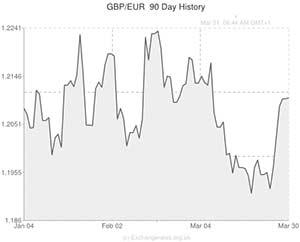
The Pound to Euro exchange rate (GBP/EUR) is currently fluctuating close to the 1.2100 handle but it is possible that Sterling could rise to a fresh 3-week high of 1.2126 if this morning’s Eurozone Consumer Price Index report reflects badly on the region’s inflation prospects.
On Friday it was announced that price pressures in Germany – the currency bloc’s most prominent economy – decelerated from 1.2% to 1.0% during March due to falling energy prices. Some traders saw this soft figure as a harbinger of doom for the single currency, but the market response remained fairly muted ahead of this morning’s crucial inflation reading.
Last week a number of officials from the European Central Bank intimated that if inflation projections start to signal that Eurozone CPI will be lower than 1.0% by the end of the year then policymakers will announce fresh stimulus measures.
The dovish remarks made it clear that the ECB is considering cutting the benchmark interest rate and/or bringing the deposit rate into negative territory and/or starting a QE-style bond-buying scheme.
However, the efficacy of each of these easing schemes is difficult to predict. Another interest rate cut could drive investors out of the currency bloc, a move towards negative deposit rates could merely cause banks to hoard more of their own funds in current accounts and quantitative easing has never been less necessary considering that sovereign bond yields are fairly well grounded at this moment in time.
One thing that is fairly easy to predict is that any/all of these easing measures would probably reduce demand for the single currency. This would probably help spur inflation as a weaker domestic currency often leads to higher prices for consumers.
Policymakers at the ECB know that fresh stimulus is not necessarily going to give the 18-nation bloc the liquidity boost that it needs to drive lending and investment, however, if CPI continues to flounder below the Bank’s target range then it is entirely possible that President Mario Draghi could loosen monetary policy, if only to soften the Euro exchange rate and boost inflation that way.
Today’s CPI print is expected to print at 0.6%, which would mark a fall from 0.8% and would represent the lowest figure since 2009. If the reading matches economists’ forecasts then the single currency could weaken in anticipation of a move from the ECB. If the CPI prints below 0.6% then GBP/EUR’s gains could be exaggerated.
The ECB will announce its monetary policy decision on Thursday afternoon. Considerable market volatility can be expected in the run-up to Mario Draghi’s press conference.

Comments are closed.